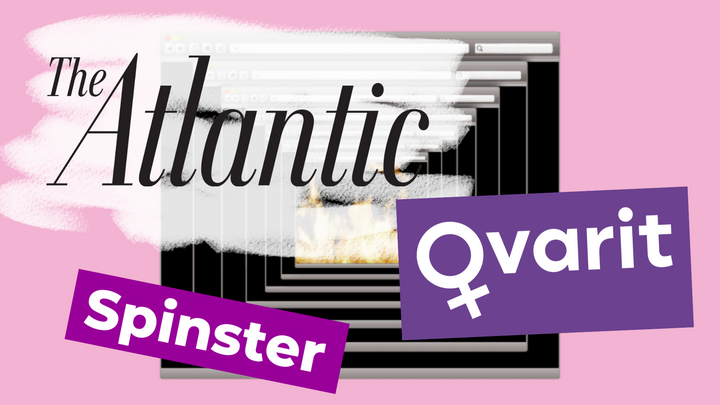Meet Taiwan's Feminists Fighting against Gender Self-ID
Grassroots activists are beginning to undermine Taiwanese institutional messaging about gender identity.

As with Mumsnet in the UK, “Vicky” (not her real name) and the other members of NoSelfID Taiwan (NSIDT) found each other on a female-focused social media site called Plurk. The group are anonymous, translator and spokeswoman Vicky tells me that they are “careful to guard their personal data” in order to avoid being targeted by transgender activists. It seems wherever one is, to fight against the might of transgenderism is to face censorship and endure threats.
The group formed in October last year, after members were horrified to discover that “like Stonewall in the UK” trans lobby groups had “secretly arranged training for schools, courts, and other governmental institutions.” Slogans from trans lobby groups compare women-only spaces to racial segregation, and push the idea that “everyone could be the offenders and victims of sexual violence” in an attempt to obfuscate the fact that it is men who commit rape.
Taiwan itself exists as a democracy under the shadow of its much bigger brother China, and it is the nation’s threatened sovereignty which dominates international headlines rather than domestic policy. But for the members of NSIDT, one of the biggest internal threats to ordinary people is an upcoming bill which seeks to make it easier to switch legal sex.
Vicky says:
“We would like to let more people know how Western trans ideology has invaded the countries in Asia and corroded our women’s rights. At the same time, we would like to draw Taiwanese people’s attention by international reports. We also hope that by doing so, our government officials will take the problems of gender self-identification more seriously.”
Until recently the law was clear; to switch legal sex, an individual had to provide reports from two psychiatrists showing a diagnosis of gender dysphoria, and a letter from a doctor to confirm that “sex reassignment” surgery has been completed. But LGBT lobby groups, most notably the Taiwan Alliance to Promote Civil Partnership Rights (TAPCPR), are pushing to abolish the requirement for an individual to have undergone medical procedures. Vicky notes that the "administrative interpretation" has already been undermined:
“TAPCPR won a lawsuit and let a trans-identified male who has not received a sex reassignment surgery be registered as a legal female. Another case of a trans-identified male is pending constitutional interpretation.”
Ultimately, the aim of trans lobby groups is gender self-identification, the impact of which could be profound. Estimates from a Taiwanese mental health group suggest that as many as 1,200,000 might seek to change legal sex (the total population of the country is 23.57 million).
Later this year Taiwanese voters will go to the polls at local elections, but at present neither party is willing to take a definitive stance on the Gender Recognition Bill which was introduced by the previous president. Vicky believes there is a widespread lack of awareness from both politicians and the public:
“When people in Taiwan think about being trans they think of transexuals in Thailand or popular television entertainers. They don’t realise that ‘trans’ has been widened and that it now includes cross-dressing men and people who have had no surgery or hormones.”
The timing is telling, it was the passing of the legislation to allow same-sex marriage in 2019 which signaled a change in the focus of mainstream lobby groups. NSIDT believe Taiwan Alliance to Promote Civil Partnership Rights (TAPCPR) now have a financial incentive to stay in business by lobbying for gender self-identification.
A series of lawsuits have pushed gender self-identification up the political agenda. Translating for others in the group, Vicky outlines the details of a recent case to hit the headlines:
“One beauty service company was fined for not letting a trans-identified male interviewee, who has not received a sex reassignment surgery, wear female uniform and touch female customers without telling his real sex. He successfully argued this was discrimination on the basis of gender and The Ministry of Labor (MOL) fined the company.”
Other cases are undermining the existing law without making it to court. Recently a trans-identified male was accepted into a college where he was offered a space in a female dormitory. When students complained, they were told to be “more tolerant.” Male athletes who identify as trans are also taking away women’s sporting achievements and scholarship opportunities, all without critical media coverage or political comment.
Vicky says “these tactics are being used in other places in South East Asia. Similar cases brought by trans lobby groups are clogging-up legal systems in South Korea and Japan.”
She describes “trans ideology as the extension of rape culture” as “women’s wills are ignored and forced to satisfy men’s uncontrolled desires to be seen as women”.
Listening to Vicky a familiar pattern emerges of strategic litigation, biased research and consultations and politicians lazily assuming gender self-identification is the next logical step after equality for minority sexual orientations.
“Trans lobbyists and gender studies scholars are the only people who can have a say over this issue. They concealed negative cases happening globally and ignored women’s voices in national reports, research on policy making, investigations on public opinions.”
All the while, mainstream reporters seem content to take their editorial lead from trans lobby groups and impose it on the public as fact. Indeed, to date only one published writer inside Taiwan has dared to take an opposing stance: journalist and lecturer Jaclynn Joseph.
Vicky explains that NSIDT have been vilified as bigoted and “They even threatened to sue us when we revealed what they have discussed at their conferences.”
This is perhaps all the more shocking given the proud national image of Taiwan as a democracy on the fringes of a totalitarian superpower – it would be comforting to imagine this would make the public acutely aware of the importance of plurality and open debate.
Thankfully NSIDT are not entirely alone. Some YouTubers with large followings have begun to explore the issue, and a group of feminist lawyers have been scrutinizing the actions of lobby groups and the government. And from handing out pamphlets on the streets to sharing information on social media, grassroots activists are beginning to undermine the institutional messaging about gender identity.
Last year, NSIDT started two petitions in opposition to gender self-identification on Taiwan’s Public Policy Participation Platform, each of which garnered over 5,000 signatures. The first demanded a halt to the alteration of the sex marker on identity cards without proof of sex reassignment surgery, and the other for “clear separation for the safety of women and children.” In December NSIDT are due to give “a presentation in the conference of Taiwan’s shadow report to the CEDAW’s international committee.”
Cultural differences between East and West allow some breathing space from the arguments used by trans activists elsewhere.
“They can’t accuse us of being Christians or funded by evangelicals. Christians are a minority in Taiwan; in the group we have lots of different beliefs from Buddhism to Taoism. They also can’t smear us as racist because the ethnic make-up of Taiwan is very different, 95% of our population is Han Chinese and just 5% are indigenous.”
Second wave feminism didn’t wash-over Taiwan as it did Europe and the US, instead many opted to fuse traditional Confucian beliefs which emphasize compromise and women’s status within the home. But today the invasion of gender self-identification has galvanized women from all walks of life. The threat to abolish sex as a legal category has made many women in Taiwan think not only about what they have to lose, but what they each have to gain by working together.
4W provides a platform for over 70 feminist writers in countries spanning the globe. This work is made possible thanks to our paid monthly subscribers. Join today to support our work!
Enter your email below to sign in or become a 4W member and join the conversation.
(Already did this? Try refreshing the page!)





Comments